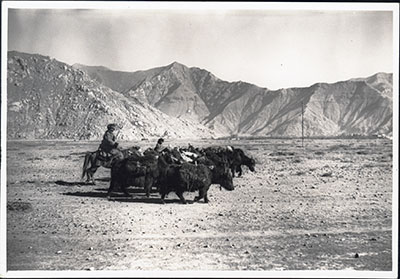
1998.131.196 (Print black & white)


1998.131.196 (Print black & white)

Frederick Spencer Chapman
Frederick Spencer Chapman
January 1937
Lhasa Area
1998.131.196
111 x 159 mm
Print gelatin silver
Donated 1994
Faith Spencer Chapman
British Diplomatic Mission to Lhasa 1936-37
Frederick Spencer Chapman
7.9 [view film roll]
SC.T.2.196
'Lhasa Mission 1936, Diary of Events', P. Neame, H. Richardson, F. S. Chapman, Government of India Political Department [Note: photographs for October 18th - November 4th 1936 are not included as their relationship to text is not detailed; see Mission Diary text for details of images] [view list of illustrations]
Notes on print/mount - "7-9" and "F.S.Chapman" have been written on the back of the print in pencil. This relates to the numbering system for images that Chapman used during his time on the Gould Mission to Lhasa in 1936-37 [MS 17/1/2005]
Manual Catalogues - Caption in Chapman's hand-written list of negatives made whilst on the Mission to Lhasa, 1936-7 [See PRM Manuscripts Collection]: 'Yaks and mounted Kamba' [MS 13/03/2006]
Other Information - Related Images: The reference '7-9' helps to identify this as an image that was probably taken during January 1937. Images prefixed with this figure comprise a group of negatives containing images of the Potala, yaks and donkeys [MS 13/03/2006]
Contemporary Publication - This photograph was used to illustrate the official Mission Diary for the period January 15th to 31st 1937. Chapman captioned this image in the official Mission Diary as "Yaks laden with wool leaving Lhasa" [MS 12/3/2005]
Other Information - Setting: Chapman wrote the following in relation to this image in the Mission Diary for the period stated: "Now that there is no grazing to tempt the pack-animals to dally by the way, and no rain to spoil their loads, there is much traffic on the trade routes. Any day you can see trains of mules, donkeys and yaks carrying the rough Tibetan wool down to India; and, approaching the city, loads of brick tea sewn in compact square packages, bundles of dried yak-dung for fuel, and striped yak hair bags of barley flour, which with the salt buttery Tibetan tea forms the staple diet of all the poorer classes." [MS 12/3/2005]
Other Information - Cultural Background: This image could be of a trader because of the number of yaks and the nature of the loads they are carrying. It is not clear for what reason there is a wooden pole standing upright in the right of the image. Although telegraph lines had been extended to Lhasa from 1923 onwards, this pole does not appear to be connected with any wires or to have spatially related to others in a system. The dark border at the bottom and around the sleeves of the man's coat is likely to be made of fox fur. Wealthy people might choose to have different kinds of fur, such as leopard skin to adorn their clothing [TS 20/1/2005]
For Citation use:
The Tibet Album.
"Yaks and trader in Lhasa Valley"
05 Dec. 2006. The Pitt Rivers Museum.
<http://tibet.prm.ox.ac.uk/photo_1998.131.196.html>.
For more information about photographic usage or to order prints, please visit the The Pitt Rivers Museum.
© The Pitt Rivers Museum